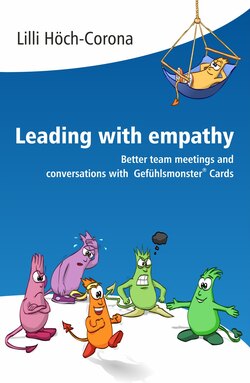Читать книгу Leading with empathy - Lilli Höch-Corona - Страница 7
На сайте Литреса книга снята с продажи.
ОглавлениеIntroduction
Each chapter of this book is about feelings; about pleasant, difficult, different and common feelings, past and present, inside and outside and surprising feelings.
Feelings have a tendency to come over us sometimes at the wrong moment. This can lead to problems especially with difficult feelings. Conversations about feelings help us to better process what we have experienced, to make differences and similarities clear and to develop new ways of working together. The Gefühlsmonster® Cards can facilitate these conversations.
"I couldn't listen very well, I was too annoyed to do so – but I could still watch, and then I saw that my colleague was also feeling bad.” These were words from a mediation client in one of my first attempts to use the Gefühlsmonsters in mediation. In the 15 years that followed, I developed many other techniques in conversation with our users and colleagues, such as how the visualization of feelings can facilitate the start of a conversation, stimulate a change of perspective and make group opinions visible.
With this book, I would like to contribute to making an exchange about feelings easier and, if possible, to help create a permanently improved basis for communication.
This will not be the case for everyone, just as it is not always a good idea to talk about feelings at every moment. The decision about this is up to you, the reader.
What you will find in this book is a collection of proven tools for group work, self-management, individual counselling and conflict resolution.
Our communication is complex – and we are all different. Our experiences sometimes determine our actions more than we would like, and what we experience is as different as the world we grew up in and live in.
Being annoyed causes the usual tunnel vision, makes us not see the paths we can take, separates us from people we actually love or with whom we work on important projects.
As one of the first mediation instructors in Berlin, I quickly realized that no technique, no matter how good, could be a foolproof guide for how to handle difficult situations. Besides all that we can learn about techniques and communication, we are always challenged to get involved as a person with what makes us who we are. At the same time, good techniques can give us ideas for constructive strategies, so that we can take people and groups one step further on their path based on our knowledge, empathy and experience.
How to use this book?
I explicitly encourage you to first try out those tools that appeal to you. The best practice examples at the beginning of each tool show what the technique is all about and help you to understand the next steps. If you feel like trying out a technique, this is exactly the right place to start.
I wish you good experiences with the techniques in this book – and many ideas for your own work!
